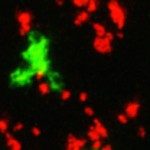Link to Pubmed [PMID] – 12218121
J. Immunol. 2002 Sep;169(6):3053-60
We immunized mice with antigenic peptide P815E, which is presented by H-2K(d) and recognized by tumor-specific CTL raised against P815 tumor cells. This peptide is encoded by the ubiquitously expressed gene MsrA and carries a mutated residue conferring tumor specificity. Unexpectedly, we observed a severe toxicity occurring in the early hours after the third injection, resulting in the death of most mice within 24 h. The toxic syndrome was reminiscent of TNF-induced shock, and the sera of ill mice contained high levels of TNF. Toxicity was prevented by injection of neutralizing anti-TNF Abs, confirming the involvement of TNF. Depletion of CD8+ T cells could also prevent toxicity, and ex vivo experiments confirmed that CD8+ lymphocytes were the major cellular source of TNF in immunized mice. Tetramer analysis of the lymphocytes of immunized mice indicated a massive expansion of P815E-specific T cells, up to >60% of circulating CD8+ lymphocytes. A similar toxicity was observed after massive expansion of specific CD8+ T cells following immunization with another P815 peptide, which is encoded by gene P1A and was injected in a form covalently linked to an immunostimulatory peptide derived from IL-1. We conclude that the toxicity is caused by specific CD8+ lymphocytes, which are extensively amplified by peptide immunization in a QS21-based adjuvant and produce toxic levels of TNF upon further stimulation with the peptide. Our results suggest that immunotherapy trials involving new peptides should be pursued with caution and should include a careful monitoring of the T cell response.

